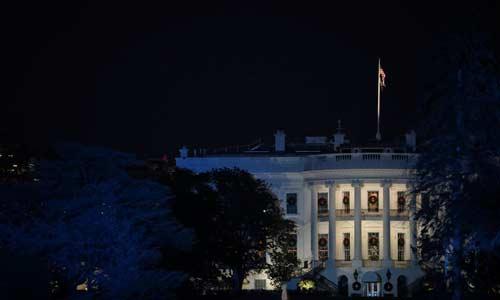Dr. Gregory Kulacki talks about what is motivating North Korean President Kim Jong Un and the possible outcomes of a summit with President Donald Trump.
In this episode
- Gregory talks about Kim Jong-Un and North Korea's goals
- Gregory discusses how the US thinks about nuclear weapons and nuclear weapon use
- Colleen and Gregory review what is and isn't on the table in the upcoming US and North Korea negotiations
- Gregory explains why we don't talk enough
Related content
Full transcript
For better or for worse, the Trump administration has announced that President Donald Trump and North Korean leader Kim Jong Un will meet in a summit in Singapore on June 12. The following interview was recorded just before this date was announced, but close enough to the rumors swirling of an impending meeting that we wanted to get an important and new perspective about what might be on the table. Here on the Got Science? podcast, we’ve talked to our global security experts about the capabilities of various North Korean nuclear-armed missiles, and the physics behind missile defense systems. But we haven’t really gotten into the humans who are operating all this machinery—specifically, the motivations and desires of North Korean leadership. Nor have we examined what’s motivating the leadership of the countries with the most to lose should war break out: South Korea, China, and Japan.
Luckily, my colleague Gregory Kulacki was in town recently from China, where he’s lived for years as our China Project Manager. He is an expert in cross-cultural communication, and the geopolitics of the region he calls home, having spent the last 15 years with UCS promoting dialogue among world leaders and NGOs on nuclear arms control and space security. He joined us on the podcast to talk about what North Korea actually wants, and what they’re afraid of… what many Americans don’t know about Chinese politics… what will happen now that Kim Jong Un has agreed to stop further nuclear testing… how this summit with Trump and Kim Jong Un might go… and how to say a few words in Mandarin.
Colleen: Gregory, nĭ hăo. Welcome to the Got Science? Podcast.
Gregory: Nĭ hăo (Hello.)
Colleen: You work with physicists, technical experts, and rocket scientists in the U.S. and China that study nuclear weapons, missile defense, rocket launch tests and specifically the nuclear program in North Korea. Your role here at UCS is to pull the technical pieces together with your expertise in cross-cultural communication and connect the dots so we can try to begin to understand the dynamics of the situation in East Asia and we do have a situation. Can you give us from your perspective what might be motivating North and South Korea, China and Japan?
Gregory: Sure. First of all, it's very hard for me to explain my job to people. You did an excellent job. I always have a lot more trouble when trying to…when people ask me, "Well, what do you do for a living?" But that's a pretty good summary. I think the thing in the U.S. is that most people don't understand that people in the region have their own ideas, their own agendas, their own hopes, their own fears that are very different than the discussion you hear back in the United States and that they act on those. And one of the benefits of my job is being able to see things through their eyes.
And I think what's happening in North Korea right now is that people in the region are taking control of the situation because we're clearly not capable of formulating a rational response under the current administration. North Korea has been pursuing nuclear weapons since the founding of the regime. I think they were particularly inspired by China's early success in the 1960s and they noticed how that success brought China, the Communist China in particular, a status internationally that it would not have been able to attain otherwise given its level of economic development and its isolation at that point.
As you remember, we recognized the government on Taiwan, the Republic of China, as the legitimate government of China all the way up to 1979. But that nuclear weapons test sort of made China a player, at least in North Korean eyes, that it otherwise wouldn't have. And I think that was the beginning of their reasons for wanting to pursue nuclear weapons. And so it's interesting that they've kept on with that consistently despite all the international pressure and now, they feel like they've finally succeeded. And for them, it's not so much a military accomplishment as it is a diplomatic accomplishment, a status accomplishment.
So for that reason, when Kim is saying, "We're done. We've got what we need. We're ready to stop." I think he's probably telling the truth because the political goal that was always the motivation for the nuclear weapons program, that they've achieved it.
Colleen: So in your opinion, Kim Jong-un is not crazy as many people would characterize him but he's actually had a strategy and he's followed that and he's now at the point where he has what he wants or what does he want?
Gregory: Well, he's inherited this from his father and his grandfather and he's modeling himself more after his grandfather, even his appearance than his father. But if my assumption is right, that this really isn't about a military capability, a deterrent capability in the sense that military strategists or technological people talk about this but that it's a political achievement, then I think that he is probably telling the truth about feeling that political achievement that his family has been pursuing for a long time has been accomplished, has, in fact, been accomplished is something that we can believe in, that's a very rational and long term pursuit of a clear objective that leads you to believe he's not crazy.
On the other hand, the way the government treats its own population is just horrific and totally unnecessary. I mean human rights groups have documented the Gulags, the impoverishment, the lack of concern for the basic welfare of most of the population, it's hard to describe as rational although we see this in many countries in the world. So in that sense, you could say that he's certainly not an admirable or trustworthy figure and neither were his father or grandfather. But rationality in terms of having a goal and pursuing a goal was something that seems to be undeniable.
Colleen: So what do you think his next step is?
Gregory: Economic development.
Colleen: So that's what he's after?
Gregory: Right. So Kim is gonna be able to turn to his population and say, "I know we've treated you horribly for 70 years but we succeeded in what we set out to do. We have a nuclear weapon and we've gotten the president of the United States to come and talk to us." And so he will be able to turn to his population and say, "I know you've suffered but it was worth it. We won. We've achieved what we set out to do and now, we can set about improving your standard of living in your life." And I think that's…they've already started that under his government.
The changes, the economic changes, in North Korea from everyone who's been there, I have not personally myself been there, describing what's happening is the economy has been improving a lot over the last 10 years. And now, it's poised for a sort of takeoff and I think that's probably where he's gonna focus his energies.
Colleen: What would an improved economy look like?
Gregory: So an improved economy would be something like what happened in China during the early 1980s. Again, they're sort of following the Chinese model and the Chinese look at the future of North Korea the way they look at their own past. So a gradual opening up of the economy, allowing for more market-based activity, people have a little bit more freedom to make choices about work and business that will stimulate economic development and that will gradually bring up everybody's standard of living. The trick for the Kim regime is gonna be holding on to political power.
Once ordinary North Koreans have a higher standard of living and a general higher education about the world they live in and their place in it whether they're gonna be angry at the regime about how they've had to suffer so long and whether or not that was worth it. I think that's the biggest anxiety and the biggest problem that the North Korean regime faces. The thing they're afraid of most is their own population.
Colleen: President Trump is poised to meet with Kim Jong-un. Do you think that Kim Jong-un will dismantle what he has built?
Gregory: In terms of whether North Korea will dismantle, you know, denuclearize as they describe it, there's a lot of different opinions on that. Our Chinese colleagues don't see that as a realistic short-term and by short, people are talking about the next 10 to 20 years, as a realistic short-term accomplishment only because it's the only bargaining chip that North Korea has with the United States.
And as soon as they surrender it, they're gonna lose whatever advantages they have in terms of being able to get what they want from us although they don't really want very much. They're not gonna believe any assurance from the United States that we're not gonna attack them. The United States is not gonna withdraw its forces from Japan and South Korea. They're still gonna be present in the region. The United States is not going to stop doing all these exercises which are actually more aimed at the Chinese than they are at the North Koreans. So the U.S. military presence is not going to go away and since the U.S. military presence is not going to go away, the Chinese don't believe there's any chance at all that the North Koreans are gonna give up what they have.
But apparently, the North Koreans are going to stop going further. China wanted a freeze on missile test and nuclear weapons tests and it looks like they got that before the negotiations have even started. So it seems like China and North Korea have cut their deal already and that probably is going to be enough for North Korea for China to just open the economic window a little bit. North Korea has a tiny economy. It doesn't need all that many inputs from the outside to grow. And so it looks like they've already decided what the future is going to be and it's just a question of whether or not the international community is going to go along with that or not.
Colleen: So what you're saying is that Kim Jong-un from the North Korean standpoint, they can have the meeting. If nothing happens, if a tiny bit of something happens, it will be declared a success and then they'll move on because you think they've already cut this deal.
Gregory: All they want is the meeting itself. So if the meeting happens, Kim has what he needs to turn to his population and say, "We have the weapon. We got the U.S. president here."
Colleen: And they've got some relief from China so they can start growing their economy.
Gregory: So this is the difficult part. There are very strict UN sanctions in place and China has signed on to those sanctions. So in order for China to open the economic door a little bit and for the South Koreans to do the same, there is going to have to be some relaxation of those sanctions which means there's gonna have to be some concession from the United States to relax those sanctions. They don't need to relax anything that's related to technological development or the missile program or the nuclear testing program, just the things that have to do with the civilian economy.
So the question is what can North Korea give the United States in this meeting that will allow the United States to just back off a little bit on these most severe economic sanctions and that will be a victory for them. And that will give the Chinese who were gonna honor their UN commitments. I mean for all the problems we have with China on a variety of issues, China takes its word to the international community not necessarily in bilateral agreements which they don't like to make especially trade agreements, for example, with the United States.
But when it comes to anything they sign on internationally, that has to do with international law, they're gonna try to honor that as best as they can for their own reputation in the world. So they're gonna need some way to get out of some of these sanctions that they've signed up to. I think that, for their side, is what they're trying to get out of these negotiations. The United States has very unrealistic expectations. The idea that the North Koreans are gonna denuclearize and verifiably get rid of everything they have in a two to five-year period of time, nobody I know in Asia, not the Japanese, not the Chinese, they do not imagine that as a possibility.
[Break]
Colleen: So another confounding issue with nuclear weapons is first use. What is the current policy on that and how do each of these countries interpret that?
Gregory: So the United States actually used nuclear weapons and they got two lessons out of that. The first lesson was it ended the war and the general consensus, especially on the military and foreign policy establishment, was it was a useful thing to do. The second though is it was horrific. And as they learned about the long-term consequences of the use of the weapons by following the lives of the survivors, a taboo against any future use of nuclear weapons took place and has been growing ever since. There is some sense in the world that maybe it's weakening because the people who lived through the experience are almost gone.
And this is a natural human thing that happens. I guess that's just the way we are as human beings. Maybe we have somebody on staff that can explain that psychology but I still think the taboo is pretty strong. The Chinese believe the taboo is very strong which is why they have a small arsenal that's predicated on the assumption that the taboo is strong that no nation would risk a nuclear war. And so the only reason they have nuclear weapons is to make sure that they have one that can get through and strike an adversary which will give them pause before using them against the Chinese.
The Indians have a no first use policy. Russia used to have a no first use policy but it doesn't anymore. The United States doesn't believe any of those things. They believe that everybody thinks about nuclear weapons the same way that they do which is that it's just like any other weapon. And unfortunately, the U.S. military and foreign policy establishment still thinks of nuclear weapons that way, something that actually can be used only in an extreme circumstance but something that actually can be used.
And even President Obama despite enormous pressure from our community and from knowledgeable people inside his administration to have a no first use policy still wouldn't do it because he wanted to preserve the option in certain extreme circumstances to use nuclear weapons first. The Trump administration, unfortunately, is now expanding the range of options where it would consider using nuclear weapons first.
Colleen: Well, that raises another interesting question and that's the talk about developing low-yield tactical nuclear weapons which seems like that could be really disastrous. What are your thoughts on that and how would say, China respond to a small nuclear weapon?
Gregory: So the first thing I think people need to know is we already have them. We don't need new ones. We already have low-yield nuclear weapons. We have I think 7 different types of warheads and we have 11 different yield or size options that range from 0.3 kilotons all the way up through, you know, 1.2 megatons, I think, is the largest one we still have although I'm not certain about that so don't hold me to it. But we already have low-yield weapons.
The thing about the Trump administration is now they're celebrating the fact that we have these weapons and they're talking about different new delivery vehicles they could put in place to get these into the battlefield. And they're saying in a way that no U.S. president has since the height of the Cold War that they're actually contemplating a lot of different scenarios in which they might use them. And especially troubling to the Chinese is that they would use them in a conventional war with China. That if we got into a large-scale conventional conflict with China and we felt like we were losing or not winning, that we might resort to them.
The U.S. military, assuming the Chinese think the same way, thinks the Chinese might use them first. But the Chinese have no low-yield nuclear options. Their biggest…their smallest bomb is well over 100 kilotons. So they haven't created an arsenal with the imagination that they would use them first. The thing to watch for is whether that changes in China. Whether they decide that in response to this U.S. emphasis on low-yield weapons that they'll do the same. Personally, I don't see that happening because they've always faced that dilemma.
We were threatening to use nuclear weapons against China and Korea. We threatened to use them against these Island crises over Taiwan in '54 and '58 even when they didn't have nuclear weapons. So I don't think their policy is going to change but that's something obviously that no one can predict especially given how closed their system is. We have a lot of contacts in that system through the work we've done with Chinese scientists especially in the labs over the last 30 years. Created an enormous network of scientists and engineers within the Chinese defense establishment through our summer symposiums that we can access and ask questions and get a sense of what’s going on. But those are essentially political decisions, not technical decisions and that’s an area of Chinese life that’s even closed to their own people and that certainly we don’t have access to.
Colleen: So Gregory, you've lived in China for…you've lived in China for a number of years.
Gregory: Yes.
Colleen: Probably if you add them all up, it would be a couple of decades.
Gregory: More than that actually.
Colleen: Yes. Okay. What would you say the biggest area for misinterpretation is?
Gregory: Language is your only window to do that. At least that allows you to have broader communication in the other culture and forces you to describe the world using their language and you begin to start to see things from their point of view. In the defense world, because of secrecy and…we don't have anybody in our bureaucracy who has those skills. If you stay a long time in China and you have a lot of Chinese friends, you're never going to get a security clearance ever. So they don't have the ability because of structural reasons that make a lot of sense to be able to see things the way Chinese see things. And so we assume they think like we do but actually, it's clear that they don't and that's where all the problems come from.
Colleen: So if we flip that around and…what do you think it is that China misinterprets about the U.S.?
Gregory: I'll have to say, and maybe this has to do with the nature of superior and inferior relationships, power relationships that have existed between the West and China for a long time, they've been much more energetic in their efforts to learn about us than we have in the other direction but they still face the same problems. So for example in the defense world, everything that comes out of the Pentagon or that comes out of the State Department, all these reports we produce, they take them like they're the word of God. You know, like everything that's in them is actually U.S. policy and they don't understand the way these documents and committees and things are actually very complicated parts of a messy, indeterminate bureaucratic process that doesn't have a specific outcome.
So they tend to see intention on our part where it doesn't exist just like we do on their side. They assume a lot of things about us that aren't true because of their lack of familiarity with the way decisions are made in the United States even though they spend a lot more time studying us than we spend studying them. And the Chinese, of course, speak our language, speak English in much greater numbers than Americans speak Chinese.
Colleen: So the answer is if everyone would just sit down and talk, maybe we'd learn something?
Gregory: We do not talk enough. We do not talk enough. And it's amazing because there is so much commerce and contact and things going on between China and the United States but in the government world, in the security world, we just don't talk enough at all to the Chinese.
Colleen: Well, Gregory, xièxiè (thank you.)
Gregory: Bú kèqì (You're welcome.)
Credits
Sidelining Science: Shreya Durvasula
Editing: Omari Spears
Music: Brian Middleton
Research and writing: Pamela Worth
Executive producer: Rich Hayes
Host: Colleen MacDonald



